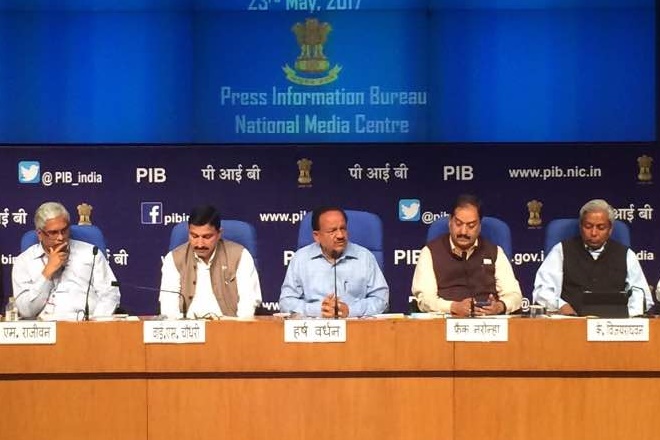The three years of Narendra Modi government at the Centre have seen many new developments in the country. Union Minister of Science and Technology and Earth Sciences Dr Harshvardhan on May 23 said that India has moved from the era of “brain drain” to “brain gain” as over 1000 Indian scientists have returned from foreign countries to work in India during the three years of Modi government.
Asserting that Indian scientists and research are not inferior to anyone in the world, Harshvardhan said that Indian scientists, who had earlier migrated to work in other countries, have started to return because of Modi’s government’s initiatives to boost science research in the country. “Now our scientists have access to the best facility.”
The minister said that the returning scientists have joined almost all research areas. “They are all well-meaning people, interested in the betterment of India,” Harshvardhan said, adding that “1000 is a very modest estimate.”
Modi government came to power in May 2014. Since then Prime Minister Narendra Modi has himself shown a lot of interest in improving the science research situation in the country.
साथ है, विश्वास है…हो रहा विकास है! pic.twitter.com/uWtw6WbCmD
— Narendra Modi (@narendramodi) May 26, 2017
Talking about the new plans to be carried out in the next two years in science and research sectors, Harshvardhan said that around 1 lakh scientists would be specially trained by the government in the coming years. “We are going to train 1 lakh scientists to realise the New India vision,” the minister said.
He also said that the government would launch a new ‘Jigyasa’ scheme in the next few days for schoolchildren of Kendriya Vidyalayas. Under the scheme, KV children would get an opportunity to visit big laboratories of the country and stay there for a week. This will help boost curiosity of the children towards science.
In a bid to find a solution to the drought problem in some areas of the country, the minister said the government would launch a cloud-seeding project this year in Solapur, Maharashtra and it will continue for three years.
LIVE: Going to procure Polar Research Vessel for polar expedition: @moesgoi https://t.co/S7IdUhu9Z3 pic.twitter.com/lAizFFUmVd
— PIB India (@PIB_India) May 23, 2017
He further informed that India would get a Polar Research Vehicle in the next three years. Besides, he said, ” Soon you would get to see solar-powered ATMs. Research on this is at a very advanced stage.”
Harshvardhan said that India’s growth in the science sector has been remarkable in the last three years. “In terms of the development of scientific research, the international growth rate is about 4%, but Indian is 13% right now. This is an indicator of the success of our efforts, inspired by the vision of PM Modi,” he said.
“In a short span of time, we have become the sixth country in the world with the maximum number of research. In the next two years, we aim to become number 4 or 5. In Nanotech research, India has become third,” he added.
Exhibition on showcasing #KeyInitiatives in #3YearOfGovt in Indian science : a walk-through pic.twitter.com/XTF9HdxwD5
— Frank Noronha (@DG_PIB) May 23, 2017
The minister pointed out that there has been a change in approach towards science and research in the last three years.
“We have tried to take science out of the four walls of the laboratory and connect it with the people. We have aligned science now to all our national priorities. We have aligned the discovery of science with the problems of people.”
#DhanyawadPMModi for transforming India in these 3 years! #MODIfiedChhattisgarh salutes your visionary leadership. #3YearsofModiGovt pic.twitter.com/GxarcCoNGU
— Dr Raman Singh (@drramansingh) May 26, 2017
The minister also said that India has done “significantly well in high-end science.” The country would soon get six big supercomputers.
Talking about the ongoing researches in the country, he said, “CSIR right now is working on over 140 inventions where we are going to help people. Most of them are in advanced stage.”

